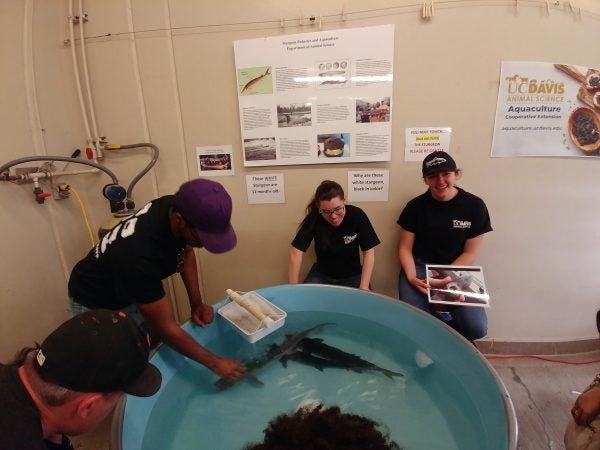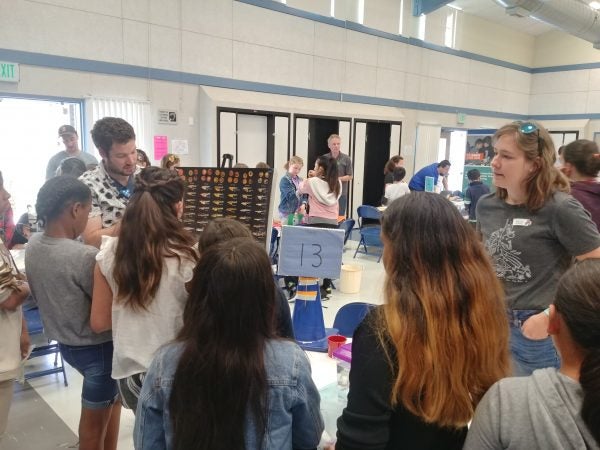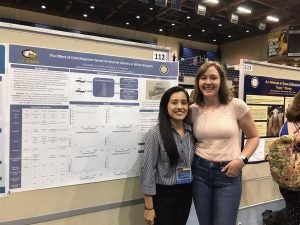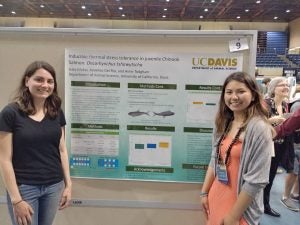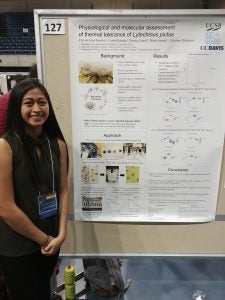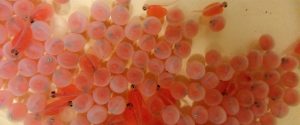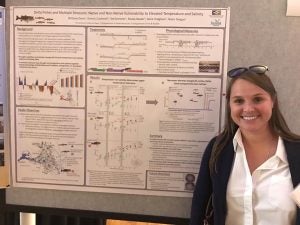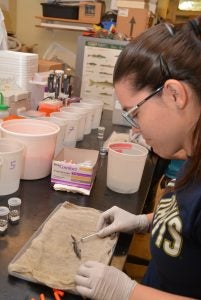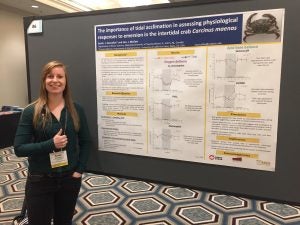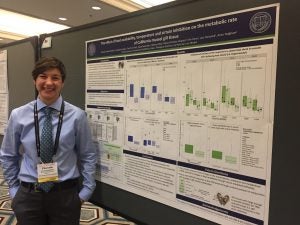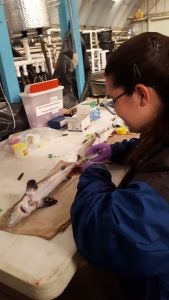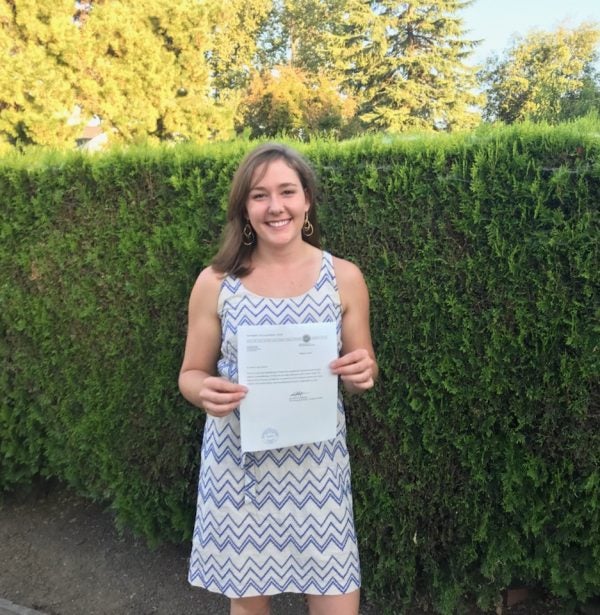 Todgham lab student Mandy Frazier completed her Master of Science degree in the Animal Biology Graduate Group. She studied the physiological differences between cannibal and non-cannibal burbot. Her research took her to Idaho where she worked with the Kootenai Tribe to study the burbot in their conservation hatchery. Mandy is continuing her research with the Todgham lab as she begins her PhD in the Graduate Group in Ecology this fall where she will study the physiology of Antarctic fish. She has already begun her second field season at the McMurdo research station with the Todgham lab Antarctic team. Well done Mandy!!
Todgham lab student Mandy Frazier completed her Master of Science degree in the Animal Biology Graduate Group. She studied the physiological differences between cannibal and non-cannibal burbot. Her research took her to Idaho where she worked with the Kootenai Tribe to study the burbot in their conservation hatchery. Mandy is continuing her research with the Todgham lab as she begins her PhD in the Graduate Group in Ecology this fall where she will study the physiology of Antarctic fish. She has already begun her second field season at the McMurdo research station with the Todgham lab Antarctic team. Well done Mandy!!
Author: amdelrio (Page 2 of 3)
We are excited to have Dr. Milica Mandic join the Todgham lab as a post-doctoral scholar. Milica will be working with our Antarctic research group to study the effects of warming and ocean acidification on metabolic plasticity in juvenile Antarctic notothenioid fish. She has expertise in biochemical and whole organism physiology of fishes from intertidal sculpins to lab colonies of zebrafish.
Welcome Milica!
Todgham lab members shared our research with the public at two annual events this spring. The Picnic Day sturgeon touch tank is always a hit as guests get to interact with white sturgeon and learn about the past and current sturgeon research conducted by the UC Davis Animal Science Department and our lab.
We also volunteered at the Marguerite Montgomery Elementary School’s Science Expo day where we shared our salmon conservation research. The students enjoyed the tank of live salmon, the survival game, and seeing early fish development through displays of preserved specimens.
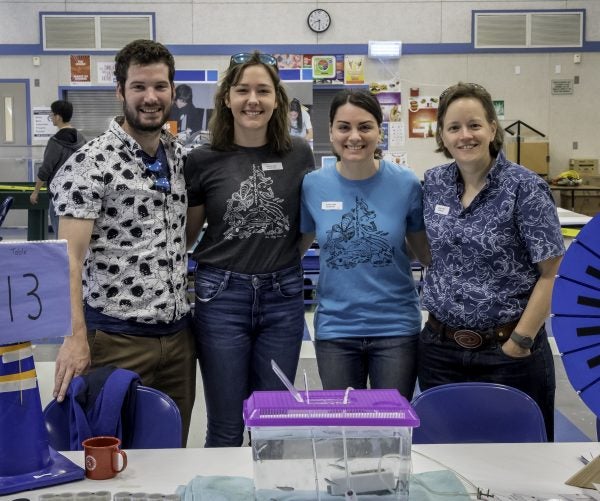
Ken Zillig, Mandy Frazier, Annelise Del Rio, and Anne Todgham at the Science Expo (Photo courtesy of Bruce Draper)
Three Todgham lab undergraduates presented posters at the 2019 UC Davis Undergraduate Research Conference. Jessica Escamilla presented her findings from testing how the centrifuge speed used in enzyme assays to study metabolism in fishes affects the quality and accuracy of the results. Gabi Mukai presented her ongoing work investigating inducible heat tolerance in juvenile Chinook salmon. Erin de Leon Sanchez presented research from her summer internship at UC Santa Barbara in the Hofmann lab where she studied thermal tolerance and gene expression in sea urchins. They all did a great job presenting!
Graduate student Annelise Del Rio published her first study investigating the effects of hypoxia (low dissolved oxygen) and warming on Chinook salmon development and physiology in the journal Conservation Physiology. She found that hypoxia reduced salmon survival and growth, but improved tolerance to acute stressors. Hypoxia and warming had significant interactions suggesting both factors are important to consider for water management strategies that target salmon survival. Her work continues to investigate the effects of warming and hypoxia on early life stage salmon.
Recent PhD graduate Brittany Davis published a study she conducted as a Delta Science Fellow in the journal Conservation Physiology . She studied the physiological responses of the native Delta Smelt and non-native Mississippi Silverside and Largemouth Bass to serial increases in salinity and temperature as single and combined stressors. She found that non-native species had consistently higher thermal tolerances than the native smelt, suggesting non-native species may do better in warm San Francisco Estuary habitats while Delta smelt populations may be negatively impacted with warming water. Congratulations Britt!
Graduate student Michaiah Leal published her second study comparing the physiology of diploid and triploid white sturgeon in the journal Comparative Biochemistry and Physiology Part A: Molecular and Integrative Physiology. She found that both ploidies have a similar stress response to an acute water reduction stressor both with and without warming, but triploid sturgeon have a reduced metabolic response to stress that may negatively affect their performance. Her work continues to investigate physiological differences in diploid and triploid sturgeon, which can both be found in commercial aquaculture facilities. Congratulations Michaiah!
Chessie and Sarah attended and presented posters at the 2018 American Physiological Society meeting in New Orleans, LA. Sarah (L) presented some of her recent master’s research about the physiological effects of tidal acclimation on the green crab. Chessie (R) presented data from an NSF funded collaborative research project on California mussels, sirtuins, and various stressors. Great job!
Todgham lab members are off to Antarctica for another season of research at McMurdo station! Anne, along with students Mandy, Ken, and Andrew, will be studying the effects of warming and ocean acidification on Antarctic fishes. Check out their expedition blog (antarctica-ecofishiology.github.io) to see what they’re up to!

Michaiah’s first sturgeon project is now published in Comparative Biochemistry and Physiology Part A: Molecular & Integrative Physiology. Her work explores the differences in stress response, immunity and metabolism in white sturgeon of different ploidies acclimated to different temperatures. Read about it at Comparative Biochemistry and Physiology Part A: Molecular & Integrative Physiology or under our Publications page. Congratulations Michaiah!
Leal, M.J., Clark, B.E., Van Eenennaam, J., Schreier, A.D., and Todgham, A.E. 2018. The effects of warm temperature acclimation on constitutive stress, immunity, and metabolism in white sturgeon (Acipenser transmontanus) of different ploidies. Comparative Biochemistry and Physiology Part A: Molecular & Integrative Physiology
A collaborative project led by Todgham lab graduate student Brittany Davis is now available at Conservation Physiology. Her work investigated the effects of CO2-acidification and hypoxia on predator prey interactions as well as metabolism. She observed compensatory responses after an acclimation period that suggest these fish may be resilient to environmental changes predicted to occur with climate change. Read all about it at Conservation Physiology or under Publications!
Davis BE, Komoroske LM, Hansen MJ, Poletto JB, Perry EN, Miller NA, Ehlman SM, Wheeler SG, Sih A, Todgham AE, Fangue NA (2018)
Juvenile rockfish show resilience to CO2-acidification and hypoxia across multiple biological scales. Conserv Physiol 6(1): coy038; doi:10.1093/
conphys/coy038.

